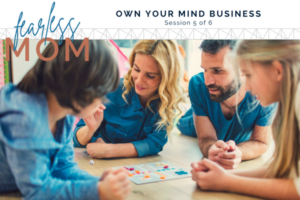In the hustle and bustle of everyday mom life, it is easy to go through seasons of operating on autopilot, rinsing and repeating over and over, day after day, week after week…until months blend into seasons, and before we know it, a full year has blown by. Some seasons are so hectic that showering becomes a luxury and a trip to the dentist can feel like a day at the spa. These busy seasons can bring so much fun and joy to your family as you watch your children perform in activities they enjoy, build new skills and work hard to achieve goals. It can be so fulfilling to cheer with your children as they celebrate successes and also comfort them when they struggle or fall short of their goals.
It is easy to get so wrapped up in our children when we are on autopilot, that we tend to lose our own identity. Our children can forget that we have duties, demands, aspirations, and goals separate from our role as “mom.”
When you go through stressful, hectic, or demanding periods, try sharing about your personal triumphs and disappointments. It is so valuable to model ways to approach and respond to demands for your children; whether it is tasks for major volunteer positions, work deadlines, or exciting projects you engage in, there is much to be taught through your example.
You can model stress management as a deadline approaches, or how to process nerves before a big presentation, or how to celebrate the victory of success. Furthermore, you can normalize the pain of disappointment or failure by letting your children see the struggle.
Oftentimes, children only see the positive outcomes of our efforts as we tend to hesitate to share our struggles. It is HARD to be vulnerable in front of your children. But, if you only share the celebrations in your world, it can foster a child’s belief that something is wrong with him/her if life is hard or if he/she fails. It can foster unhealthy levels of perfectionism in children.
When we get caught up in these busy seasons, we feel like a hamster running on a wheel. We keep that wheel spinning at all costs which often leads to us putting our own needs aside. “Exercise?” I’ll do it tomorrow. “Sleep?” Who needs it? “Nutrition?” Cheetos cover at least 3 food groups, right? “Quiet time?” What even is that? “Feelings?” Does numb qualify?
And if we’re not careful, we can reach a point of exhaustion, that if left unchecked, can lead to physical symptoms of fatigue. If we don’t carve out time for solitude, time to quiet our minds and calm our hearts – if we don’t give ourselves time to feel all of the emotions and process all the stress that we’ve set aside to keep the hamster wheel turning and our families running, our bodies will force us to slow down eventually.
Solitude is a state of mind; a space where we can focus on our own thoughts without distraction. The demands of motherhood cause us to lose solitude without even realizing it. Moms must make a conscious effort to find solitude, especially during the busy seasons.
To find your solitude, try journaling, meditating, walking in nature, or taking a minute to breathe deeply. If you have little children, solitude might be found during showers or in the few moments before you fall asleep in bed at night. Whatever strategy you choose, being intentional about this quiet time will help you increase your self-awareness. As a result, you will be able to recognize and respond to your needs more effectively…and therefore will be more capable of meeting the needs of others. Just like in the airline safety demonstrations, we must take care of our own needs before we can be of service to others. In short, we must lead ourselves first.
After each of Julie’s lectures in Fearless Mom, we set aside time for reflection. We take two minutes to process what we just heard and consider how it applies to us. We prioritize this time because we know exactly how busy life is when moms walk out the door after Fearless Mom. This reflection time is not just applicable to Fearless Mom lectures. It can be a positive experience anytime, and it only takes a couple of minutes to implement!
We use the acronym SELF to structure the reflection process. Of the millions of things in our lives that would positively impact us if they changed, there is only one that we CAN control: OURSELVES. So that is our focus during this practice in solitude.
First, we
STOP to think and pray, asking God to see things as they really are.
Then, we
EVALUATE ourselves, taking an honest look at our thoughts, feelings, and behaviors.
Next, we make a
LIST. We write down CHANGES we can make or ACTIONS we can take to become more of the woman we were called to be.
Last, we commit to the
FIGHT, we commit to digging in our heels and doing the hard work to get better and be stronger.
Maybe this week you can focus on identifying any emotions your body is harboring that your mind is unaware of. Perhaps you want to reflect upon a stressful interaction you had with your teen. Maybe you want to take a couple of moments to pause and celebrate a big milestone in your life. Or maybe you’ve got that ‘ole hamster wheel spinning so fast that you need God to show you how to get off safely. Whatever it is for you, I encourage you to set a two-minute timer and focus on yourSELF.
Implementing this simple practice regularly offers a big return on your investment. Give it a try today…and learn to Lead YourSELF First.
“Be on guard, stand FIRM in the faith. Be courageous. Be strong. And do everything with love.” 1Corinthians 16:13-14




